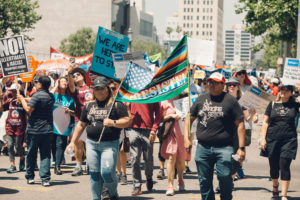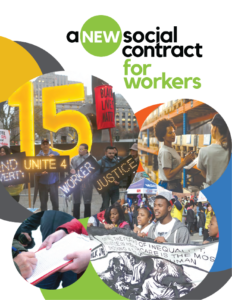We need to envision a new social contract that puts people and our planet first, one that emerges from community, worker and social-movement driven solutions promising a more equitable and liberated future for all. We can, and must, fight for and build this future together.
The New Social Contract project creates dialogue across the country about how to build this new vision. It poses the question: what would our values look like in practice if our whole society were built around them? In this report, we focus on a new social contract for workers and the jobs they take up every day. Workers and their families must be at the center of any new social contract if we are to build a resilient democracy and a just economy.
Our last social contract during the New Deal era was a step forward for the human rights of workers. But it fell short of guaranteeing decent jobs for all. It also carved out the mostly Black and brown female domestic workers and Black and brown farmworkers from its new labor laws and other protections. And Black and brown workers faced pervasive discrimination generally locking them out of higher paid industries and some of the bigger unions throughout parts of the last century. Despite Black workers creating unions of their own and the biggest unions reversing course and embracing inclusivity and civil rights powerfully by the latter half of the century, for much of the 20th century our social contract divided workers along lines of race and gender. This enabled some workers to more effectively negotiate for better conditions and left others with little support for taking collective action to improve their working lives.

As capital has globalized, employers have exploited divisions among workers along with the threat of joblessness to erode working conditions in the United States and across the globe. As a result, most US families today are living paycheck to paycheck in a constant state of economic and social insecurity.1 No racial or geographic demographic has been immune from this economic injustice, but the long history of structural racism has ensured that communities of color have been hardest hit.
In this way our 20th century social contract has unraveled. But working people, through their social movements and organizations—unions, networks, worker centers and community groups to name just a few—are developing new solutions. Many of these ideas have been tested at smaller scale, and all of them offer a dra-matically different future for working families. They express a faith in both human rights and democracy in the workplace, which translates into economic and public policy that guarantees decent jobs for all and affords workers the power and dignity to shape the terms and conditions of their work.
To begin to build a new social contract for workers, our movements are calling for the following bold new public policies:
- The Right to Collective Action at Scale: Sectoral Bargaining—By reinventing our labor law system so that workers are not forced to bargain company-by-company, but instead can negotiate fair work conditions across a whole sector and up supply chains, we can restore workers’ bargaining power at scale;
- Freedom from Arbitrary Job Loss: “Just Cause” Employment”—We can protect workers from being abruptly left with bills due and no paycheck by adopting “just cause” employment protections that require employers to give a good reason, fair notice and severance pay before a worker can be left without a job;
- The Human Right to a Decent Job: A Federal Job Guarantee—With a federal job guarantee we can end structural unemployment and ensure that every person in America has access to a decent job;
- Democracy at Work: The Cooperative Advantage—We can democratize our econ-omy and ensure workers receive a fair share of economic gains by promoting the growth of worker cooperatives that enable workers to be owners of their workplaces; and
- Universal Guarantees to Basic Needs: Medicare for All and Universal Family Care—We can free workers from inadequate employer-based benefits by creating new universal social support systems, beginning with health insurance through Medicare for All and Universal Family Care to meet their caregiving needs.
In addition to calling for these five transformational policies, workers are urging action on a broader agenda of other badly needed labor reforms. As detailed below, such reforms can pave the way for more fundamental change by responding to abusive policies and removing obstacles workers face today in their push for justice.
In addition to calling for these five transformational policies, workers are urging action on a broader agenda of other badly needed labor reforms.
Too many of our elected leaders are blocking serious dialogue about these alternatives. Many are scapegoating Black and brown families, especially those who are new immigrants, for increased economic injustice or blaming globalization, automation, and other economic forces. In reality, these injustices are the results of public policy decisions. Looking ahead to the 2020 election, we are demanding more from our leaders who should be fighting for us.


